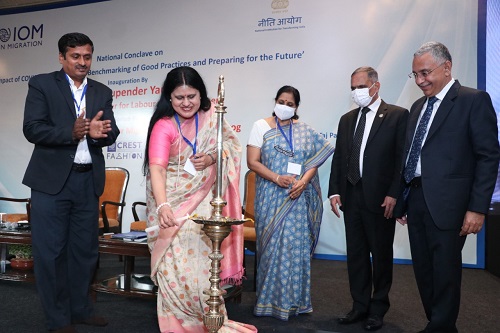National Panel Discussion on Safe Migration by IOM and NITI Aayog
New Delhi, India – The International Organization for Migration (IOM), UN Migration, in partnership with the Government of India’s think tank NITI Aayog, organized a National Conclave to initiate, contribute, and support a holistic analysis of the core areas of migration. As migration trends continue to evolve, accompanied by unprecedented challenges, the situation necessitates recognizing the potential for collaboration and coalescing of efforts toward a sustainable, safe, secure, and orderly migration model.
The Conclave broadly focused on
- Identifying and sharing of best practices and lessons learned by various states during the critical stages of the COVID-19 pandemic,
- Developing an understanding of the invaluable nature of a multi-stakeholder participatory approach, such as partnerships with the private sector for responsible migrant worker recruitment,
- Working towards combined action by states of origin and destination for migrant worker safety, buoyed by the context provided by NITI Aayog’s draft ‘National Policy Framework on Migrant Labour’; and,
- Promotion of a better understanding of, and response to, the needs and challenges of female migrants in the garment industry supply chain.
The Conclave’s inaugural ceremony began with a welcome note from Sanjay Awasthi, Head of Office, IOM’s Mission in India. Sarat Dash, Chief of Mission of Sri Lanka and Maldives and IOM DG’s Special Envoy to India and Bhutan, then delivered a special address. Dr Muniraju SB, Deputy Advisor, NITI Aayog, discussed the importance of ‘evidence-based policy formulation along with the design and delivery of compensation packages, through a need-based and in a gender-sensitive manner’. The inaugural speeches echoed the Conclave’s intent, in which diverse and seemingly disparate groups gathered as primary stakeholders to engage in dialogue, deliberation, and decision-making, which has come to symbolize migration management efforts. In addition to this being the hallmark of a whole-of-society approach, Awasthi elucidated the Government of India’s rigor in migration data management, both within and outside India. Reflecting on the economic turmoil caused by the pandemic, which resulted in a 2.2 percent decline in global remittances in 2020, Dash, ‘proud of their contribution’ spoke about migrant workers’ resilience. Despite compounding ‘vulnerabilities due to their socioeconomic status, suboptimal living environments, eligibility or access to services including health services, cultural or linguistic barriers at their destinations, migrant workers still contributed US $702 billion compared to US $718 billion in 2019’. Dr Muniraju shed light on the government’s numerous initiatives, such as the constitution of several committees under the Disaster Management Act of 2005, collaborative efforts with UN Agencies and NGOs, and the launch of nearly INR 1.7 lakh crore to assist the committees of economically disadvantaged states.
Three sessions on one day brought together stakeholders from various sectors. Representatives from the state labor departments of Maharashtra, Odisha, Telangana, Jharkhand, Gujarat, Karnataka, Tamil Nadu, Kerala, and Haryana gave detailed presentations in Session 1. Each state acknowledged the difficult challenges that arose when the ‘lockdown’ was imposed, as well as the innovative ways in which their resources were mobilized to maximize protective cover for migrant workers in the face of uncertainty.
Among the many novel initiatives were joint action between states of origin and destination to operate special trains and buses, provisions for temporary shelter and food, coordination between labor and law enforcement control rooms, the appointment of nodal officers from various departments, and monetary assistance. Dr Muniraju discussed the significance of distinguishing between ‘inter-state and intra-state due to different needs’ and ‘information management and communication control to mitigate harm through the spread of fake news’.
Session 2 concentrated on partnerships and collaborations with the private sector, which included export houses, global brands, supply chains, labor recruitment agents and agencies, non-governmental organizations (NGOs), and civil society organizations (CSOs). As the session’s Chair, Dr Surabhi Singh, India Centre for Migration, MEA, praised the practices of both public and private organizations, saying that ‘the need is to coordinate strategies and not have fragmented practices’.
Session 3, a panel discussion on ‘A National Policy for protection and welfare of Migrant Workers’, demonstrated stakeholders’ solution-seeking and sustaining capacity through appropriate and timely mobilization of resources for the benefit of migrant workers. One of the most important lessons learned was that a crisis can be turned into an opportunity, and migration is synonymous with opportunity. Panelists discussed specific policies in the states of origin and destination, recognizing the multisectoral nature of labor migration and understanding the demographic makeup of regions in order to devise adequate solutions caused by migration-related changes. It is thus critical to be clear about migration and ‘migrant workers’ without getting bogged down in ambiguous terminology that can harm migrant communities. Finally, recommendations for robust policies for child protection through programs and partnerships were made, particularly in light of COVID-19, which disrupted child protection networks.
Awasthi concluded, “Migration is an international issue and with pandemic the crisis only accelerated manifold. Through this conclave, IOM aims to create awareness about the challenges faced by migrant workers and develop best practices with the help of stakeholders, to be adopted for their safety and welfare.”
The main goal of the Conclave was to help achieve inclusive, broad-based, and effective migration governance through the sharing of experiences, expertise, and best practices. In light of this, the IOM is preparing to assist and build the capacity of public and private entities in developing a comprehensive approach to increase coordination among all stakeholders involved in human migration and mobility. The time has come to rebuild better migration management frameworks through multilateral cooperation and collaboration in order to encourage safe migration. Furthermore, as markets across the country and around the world grapple with the effects of COVID-19, it is more important than ever to investigate best practices and develop evidence-based practices.
Image Source: International Organization for Migration




 Facebook
Facebook.png) Twitter
Twitter Linkedin
Linkedin Subscribe
Subscribe